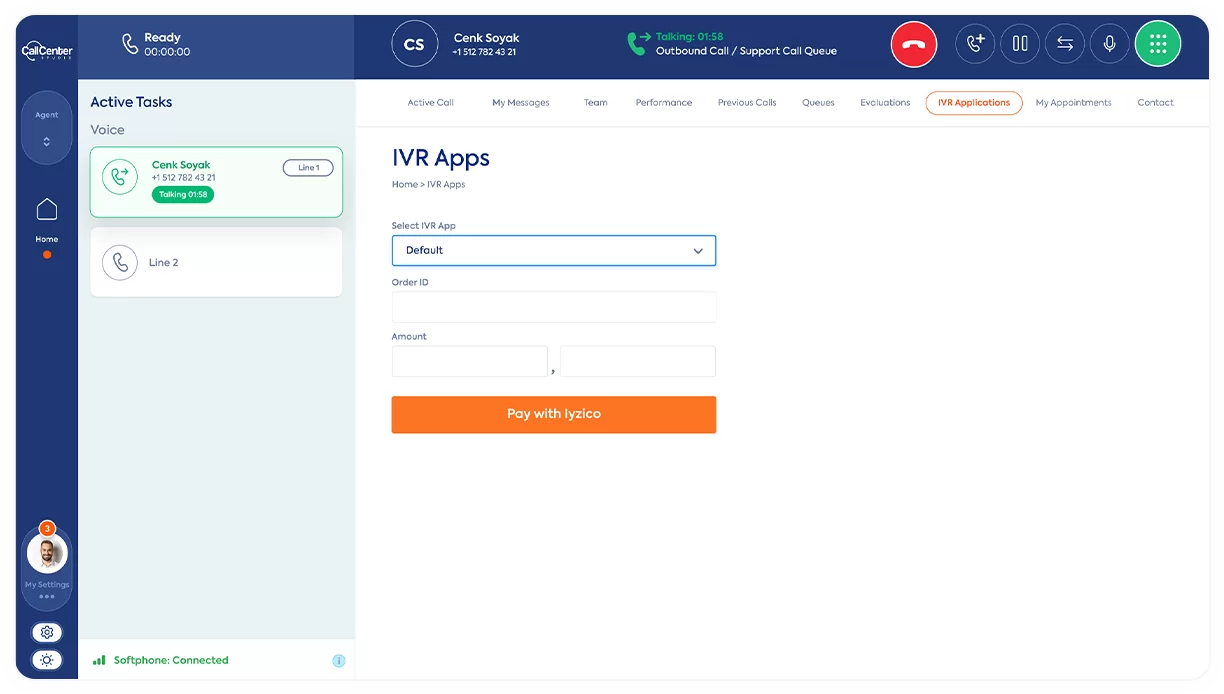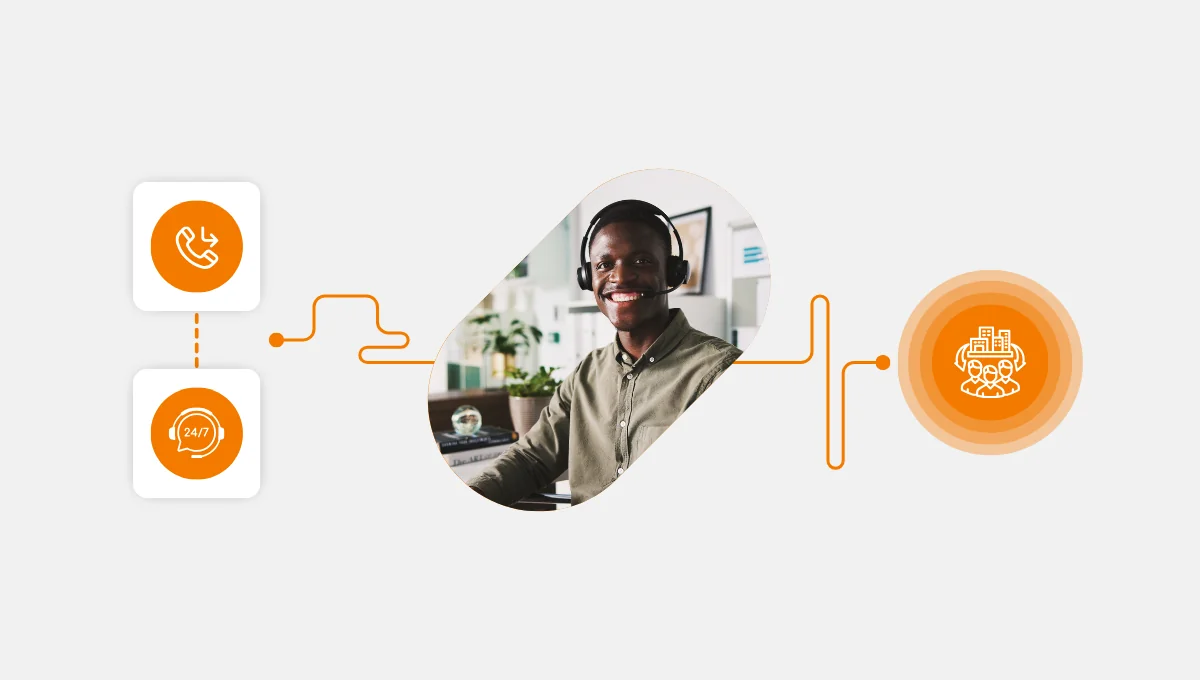Interactive Voice Response has evolved from clunky phone menus to an essential pillar of modern customer experience. It is a must-have tool to serve customers faster and smarter.
Whether you’re scaling up support, reducing operational costs, or simply trying to improve response times, a well-designed IVR system is the low-hanging fruit that delivers quick wins across the board.
Let’s break down the top 7 advantages that make IVR a competitive game-changer for businesses.
1. Smarter Customer Self-Service
Thanks to IVR, your customers can:
- Check account details,
- Make payments,
- Schedule appointments, or
- Receive real-time status updates without needing to speak with an agent.
For example,
If a customer calls their telecom provider to check their data usage, the telecom provider can use a quick IVR menu like: “Press 1 for account details, 2 for billing, 3 for data usage.”
When the customer presses 3, they instantly hear their remaining data balance and hang up. All of this happens in under a minute, with zero agent interaction.
You reduce inbound call volume, free up agent time, and meet modern expectations for instant, DIY support.
2. Reduced Wait Times, Happier Callers
It is written everywhere that the industry standard for waiting time is a maximum of 2 minutes. Because otherwise, you will see a drop in CSAT score.
What IVR does here is that it handles frequent inquiries instantly and routes customers directly to the right department without delays. Customers get help faster, and your brand avoids becoming the next complaint on social media.
As a result, faster service improves customer satisfaction, helps prevent churn, and shows you value your customers’ time.
3. Intelligent Call Routing
Think of IVR as your virtual traffic cop. It can route calls based on caller input, account information, or even behavior history. That ensures each customer lands with the right agent or team.
Advanced systems also allow skills-based routing, where calls go to agents with the specific knowledge or language skills needed.
For example:
- A Spanish-speaking customer selects their language preference at the start of the IVR menu. The system automatically routes their call to a bilingual agent.
- A VIP client calling about a technical issue is routed directly to a senior support engineer instead of a general service rep.
This kind of intelligent routing ensures that callers get the best-fit agent from the start, improving resolution times and customer satisfaction.
4. Lower Operational Costs
Let’s be blunt. We know that live support is expensive. So every call that a system handles instead of an agent means money saved.
IVR reduces your cost per contact and helps you scale without proportional increases in staffing costs.
In fact, according to a 2024 report by Deloitte, businesses using automated IVR systems saw a 30% reduction in support costs by minimizing agent workload and call durations.
Similarly, McKinsey found that companies leveraging automation in customer service experienced up to 40% efficiency gains, allowing them to reallocate resources toward higher-impact areas.
These savings come not just from fewer human interactions but from faster resolutions, reduced average handling times (AHT), and lower abandonment rates.
5. Boosted Agent Productivity
Let’s dive into the reasons for the decrease in agent motivation and how a smart IVR system can help you to remove these reasons.
Agent productivity often falls:
1. When agents are overwhelmed, routine inquiries that add little value but consume a lot of time.
- IVR handles high-frequency tasks like balance checks, order status, and appointment scheduling automatically, so agents spend less time on repeat interactions.
2. When agents spend the majority of their shift resetting passwords or answering basic FAQs.
- By integrating with backend systems, smart IVRs can perform secure verifications and guide users through automated password resets or deliver instant answers to common questions.
3. When they have to deal with long queues, unclear call routing, and a lack of system integration.
- IVR reduces queue time by pre-qualifying callers and routing them directly to the appropriate team using inputs or account data, often integrating with CRM and ticketing systems to give agents full context upfront.
4. Inconsistent workflows and inefficient escalation paths only make matters worse, dragging down overall performance and customer satisfaction.
- Smart IVRs can be configured with clear escalation rules, ensuring complex or urgent issues are prioritized and routed to senior staff automatically.
6. 24/7 Customer Support (Without the Overtime)
IVR systems work while your team sleeps. That means customers can call in after hours, on weekends, or from different time zones and still access essential services.
Whether it’s retrieving a password, checking shipping status, or reporting an issue, customers feel taken care of 24/7
As a result, always-on service improves global accessibility and builds trust with customers who expect real-time support.
7. Enhanced Customer Satisfaction & Loyalty
When customers get what they need quickly, efficiently, and on their terms, they’re more likely to stick around.
A well-implemented IVR creates a sense of control for the user and streamlines their journey.
For example,
When a banking customer calls to report a lost card, the IVR immediately verifies their identity using voice recognition, offers them a menu to block the card, and confirms the action with a text follow-up, all within two minutes.
This frictionless process reduces anxiety, avoids unnecessary transfers, and shows the customer their time is respected. These are all the drivers of loyalty.
Ready to Modernize Your Contact Center?
Call Center Studio makes implementing cloud-based IVR simple, flexible, and scalable. We help you turn customer calls into business wins without the IT headaches with:
- Intuitive tools,
- AI-powered routing, and
- Seamless integrations
Book a free demo today and see how easy it is to elevate your CX with a smarter IVR System.






